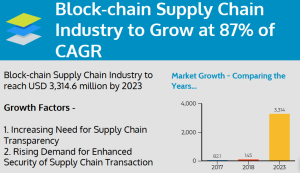The rise in uncertainty and lack of transparency have delineated in a less efficient supply chain. This is where the blockchain technology can be a panacea for logistical woes. The blockchain is a ground-breaking innovation with potential applications across industries, and acts as an enabler of technology. In short, a blockchain is a distributed digital ledger that records transactions in a series of blocks.
With customers becoming more knowledgeable and demanding transparency, it is imperative for organisations to make data – such as of price, source, authenticity, or even social obligations – accessible.
Blockchain-based solutions can provide assurance to not only millennials, but also digital generations, as access is granted to trusted, secure, and unaltered information.
According to latest research study, by MarketsandMarket, Global blockchain supply chain market size was $ 82.1 million in 2017 and is projected to reach $ 3,314.6 million by 2023, at a CAGR of 87.0%

Major vendors in the blockchain supply chain market include IBM (US), Microsoft (US), Oracle (US), SAP SE (Germany), AWS (US), Huawei (China), Bitfury (Netherlands), Auxesis Group (India), TIBCO Software (US), BTL Group (Canada), Applied Blockchain (UK), Guardtime (Estonia), Nodalblock (Spain), Peer Ledger (Canada), Blockverify (UK), TransChain (France), RecordsKeeper (Spain), Datex Corporation (US), Ownest (France), Omnichain (US), Traceparency (France), Digital Treasury Corporation (China), Chainvine (UK), VeChain (China), Algorythmix (India), and OpenXcell (US).
Ask for PDF Brochure for More Information @ https://tinyurl.com/y86ejlw7
- These players have adopted multiple business strategies to extend their global presence and expand their market shares. Partnerships, agreements, and collaborations have been the key strategies adopted by these industry players to achieve their business goals and sustain in the competitive market.
- Apart from these strategies, new product launches and product upgradations, business expansions, and venture funding are some of the other significant strategies embraced by these market players to grow in the blockchain supply chain market.
Out Of these major vendors, SAP and IBM has adopted market trends so well and maintained prominent position in the market, Below is the glimpse of strategies adopted by them;
- SAP: SAP has entered in the blockchain supply chain market by offering new products and offerings to its existing customers. E.g in May 2017, SAP launched a new blockchain in supply chain product. The blockchain technology embedded in the SAP Cloud Platform helps businesses in establishing trust and transparency while simultaneously facilitating the validation and execution of transactions.
- IBM: IBM operates in many countries, and primarily caters to the regions of the Americas, Europe, Middle East, and Africa (MEA), and Asia Pacific (APAC). Microsoft has adopted inorganic growth strategies, and has partnered with various companies to strengthen its regional presence and customer base.\
- IBM and Maersk Joint Venture – In January 2017, IBM partnered with Maersk to establish a joint venture to provide more efficient and secure methods for conducting global trade using the blockchain technology. The new joint venture company aims at offering a jointly developed global trade digitization platform built on open standards and designed for use by the entire global shipping ecosystem. It would address the need to provide more transparency and simplicity in the movement of goods across borders and trading zones